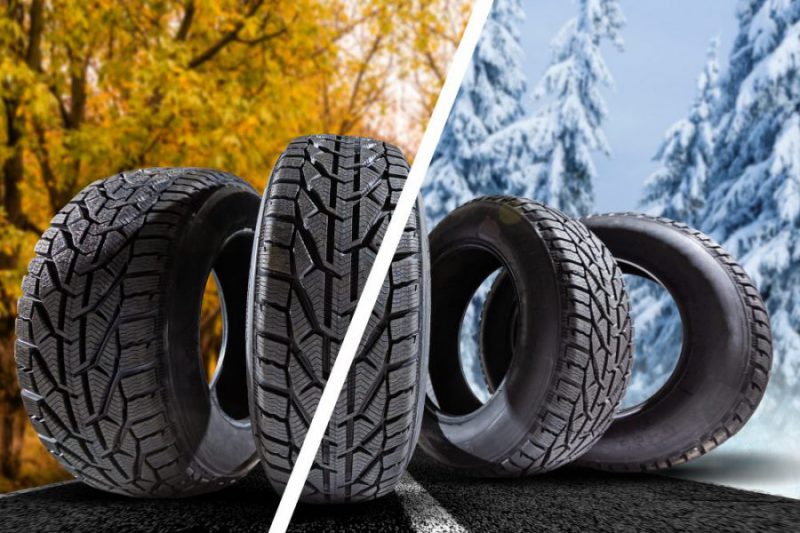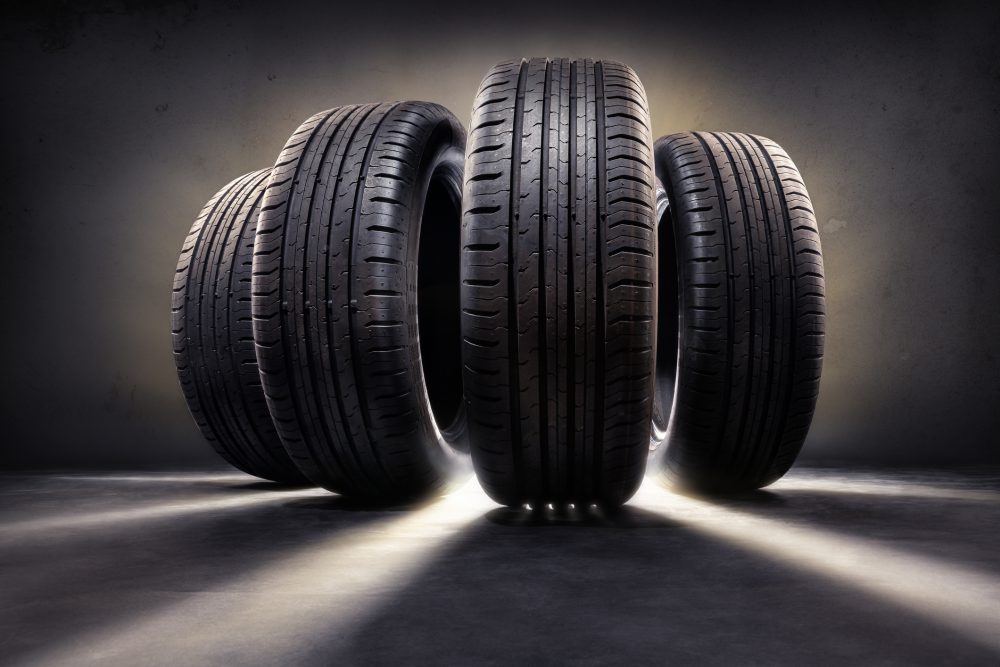
The weather is starting to warm up but there could still be times when the thermometer is struggling to nudge up from zero, particularly early in the morning or late at night. In cold conditions like this, regular tyres won’t have the grip you might expect or need.
If you’ve got the budget, the answer could be a set of winter tyres. But there is another way. You can now buy all-season tyres from many places, including the Green Flag Shop. Read on to see the benefits of these.
What are all-season tyres?
These are tyres that combine the best bits of winter and summer tyres. To understand why all-season tyres work so well, it’s important to appreciate the difference between winter and the regular ‘summer’ tyres that our cars are fitted with as standard.

What are winter tyres?
Winter tyres have a slightly different blend of ingredients – known as a compound – to summer tyres. This compound is designed to stay softer in lower temperatures, giving grip on colder road surfaces.
When the temperature drops below 7 degrees C, the rubber of regular ‘summer’ tyres gets harder. This gives them less grip on a cold road and no traction at all on snow and ice.
Treading carefully
Winter tyres also have a different tread pattern to summer tyres. Look at a regular tyre’s tread and in most cases it appears fairly simple. This is to reduce friction against the road’s surface for better fuel economy.
The tread on winter tyres looks much busier with a lot more tread blocks, the bits surrounding the grooves. Unlike summer tyres, these blocks have slashes in them, known as sipes. These are designed to bite into damp and slippery surfaces, improving grip even more.

Why are all-season tyres so good?
The beauty of all-season tyres is they provide grip on cold slippery surfaces where summer tyres have none. But they make your car handle how it would on summer tyres meaning better driving enjoyment and fuel economy than winter tyres.
Can you use winter tyres in summer?
You can use winter tyres all year round, just as you can use summer tyres throughout the colder seasons. But winter tyres don’t perform at their best when temperatures get warmer. And because they are made of a softer material, they can wear more quickly during the summer months.
Why all-season tyres suit so many drivers
In an ideal world you’d have a set of winter tyres from October to April, then fit summer tyres from April to October. That obviously involves a significant financial outlay. It also means you have to either buy a second set of wheels for the winter tyres, or pay twice a year to have the tyres on your existing rims swapped.
With all-season tyres, you don’t need two pairs of tyres. Although they might be slightly more expensive than regular summer tyres, they’re a lot cheaper than buying two sets of rubber. They also guarantee that in all but the most extreme weather – we’re talking Beast from the East ++ here – you’ll be able to get to your destination while most other drivers are slip sliding around. All-season tyres won’t just make the cold winter months safer, they’ll let you enjoy your driving when the weather warms up too.
Find the exact tyres your vehicle needs at Green Flag Tyres.
Why no obvious photo of what an all-season tyre looks like – for comparison with summer and winter tyres?
Whilst most of the justification for All Season tyres stated in the article is believable it is slightly misleading. All Season tyres are better than Summer tyres in the winter and better than Winter tyres in the summer, but are not as good as the others in the conditions they are designed for, thus All Season tyres are a compromise, not quite as good as Winter tyres in the colder months and not quite as good as Summer tyres in the warmer months. Your article also implies that Winter tyres used all year round would wear more quickly than Summer tyres. This is not entirely accurate as the service life of a Winter tyre is longer when measured over a full twelve months. I know of several drivers who have used Winter tyres all year and the service life was significantly longer than the standard Summer tyre and when I say significant I really do mean it. The downside is the car will use more fuel as a Winter tyre’s energy consumption is greater that a Summer tyre. Therefore motorists have to choose between tyre life and fuel costs.
If All Season tyres were as good as the manufacturers claim, there would be no need for Summer and Winter tyres too, when considering the moderate Winter conditions we experience in the UK.
For the benefit of Eric Hayman I don’t have a photo of an All Season tyre pattern, but they are more towards that of a winter tyre than that of a summer tyre.
I changed to all season tyres in January . A German brand. Even in a powerful car 320BHP in all types of driving I cannot fault them. 10cm of powder snow in Europe was easy.. Motorway runs including 150mph in Germany..no probs… packed snow on hill with artics failing to get grip…easy.. windy roads around home more than enough grip with the same fuel economy as I was getting on summer tyres. I wouldn’t change back
There is no mention of whether All Season tyres are legal in European countries that require Winter tyres between October and April.
I’ve had these tyres in the past and wouldn’t have them again. As mentioned earlier they are a compromise but no mention in the article about road noise – which increases significantly. I was quite prepared to put up with the increase in road noise in winter for the extra safety factor, but in summer , no. Put ‘normal’ tyres on (good ones!) and drive to suit the conditions.
I would say from experience the all season contis I have are at least the same for noise if not quieter
For most drivers in the UK winter is fairly mild and not cold enough to justify the outlay in buying and storing a second set of winter tyres or even buying all season tyres. A decent set of normal summer tyres is up to the job on most main roads and as mentioned our winters are generally mild with the exception of the odd year.
I switched to all season tyres when the Michelin Cross Climates became available. I’m now on my second set. Compared to the Pirelli tyres the car came with the consumption is 2-3mpg better (based on brim to brim measurements) and I find them quieter, more comfortable and better road holding. What’s not to like? And yes, provided you buy the right ones with the correct markings they can be used as an alternative to winter tyres where these are compulsory.
Of course the cost of the winter tyres is offset by the fact that your car is only wearing each set of tyres for half the year. So each set of tyres will last longer. If you keep the car a few years its not a great overhead.
Strangely we are currently getting better fuel economy using our winter tyres than we do with the summer ones. Maybe we drive more carefully in winter!